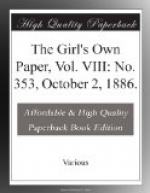Into the teacher’s work it is not our province to go; but we would ask the learner to be armed with courage and perseverance, and to practise patiently. Success is more than likely.
We now proceed with advice to one possessed of some knowledge of organ-playing and some acquaintance with its technical capabilities. First, we should say—Play on all available instruments, as no two are alike, and the stops are called by many different names, which must be identified quickly as emergencies arise. Then acquire a knowledge of harmony, specially useful in accompanying church music with dignity, and enabling the player to fill in chords which the vocal score (or voice parts) have left thin and ineffective. Volumes might be written on accompaniments; but on this subject we would advise amateurs to consult heart, head, and common sense, and we would recommend them to read Dr. Bridge’s “Organ Accompaniment,” one of Novello’s music primers, which will open out to them many possibilities, on the use of which they must decide for themselves according to their technical ability and the effect they aim at. It may be they can only try to pull a few weak voices through the singing allotted to them—in which case a strong, steady accompaniment of the simplest description is the best.
One word on voluntaries. These should be chosen with great care and the deepest respect for the church and the instrument, and kept well within the powers of the player. Amateurs do not as a rule obtain much control of their nerves, and the greatest help in the world is given by the knowledge that there is not a “difficult bit” coming. Voluntary books are not quite to be trusted, as their selection often contains operatic music very unfit for organ or church; but they generally contain some pieces of a sacred and dignified character, which may be useful.




